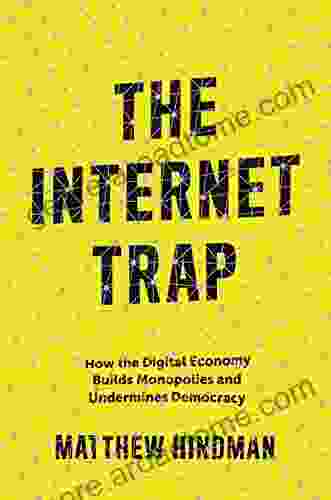**How the Digital Economy Builds Monopolies and Undermines Democracy**

The digital economy has brought about unprecedented technological progress and convenience. However, it has also led to a dangerous concentration of power in the hands of a few tech giants. These companies have used their market dominance to stifle competition, exploit consumers, and undermine our democracy.
In How the Digital Economy Builds Monopolies and Undermines Democracy, [Author's Name] reveals the inner workings of the digital economy and shows how it is empowering monopolies and threatening our democracy.
The digital economy is characterized by high fixed costs and low marginal costs. This means that it is difficult for new companies to enter the market and compete with established giants. As a result, the digital economy is prone to natural monopolies.
4 out of 5
| Language | : | English |
| File size | : | 5043 KB |
| Text-to-Speech | : | Enabled |
| Screen Reader | : | Supported |
| Enhanced typesetting | : | Enabled |
| Word Wise | : | Enabled |
| Print length | : | 247 pages |
However, the digital economy also has a number of unique features that make it even more conducive to the formation of monopolies. These include:
>* Network effects: The value of a digital service increases as more people use it. This creates a powerful incentive for consumers to use the dominant platform, which in turn makes it even more difficult for new entrants to compete. >* Data advantage: Digital companies collect vast amounts of data about their users. This data can be used to improve their services, target advertising, and even manipulate consumer behavior. This gives digital monopolies a significant competitive advantage over new entrants. >* Economies of scale: Digital companies can achieve significant economies of scale by spreading their fixed costs over a large number of users. This makes it even more difficult for new entrants to compete.
As a result of these factors, the digital economy is dominated by a few tech giants that have amassed enormous market power. These companies include Google, Our Book Library, Facebook, Apple, and Microsoft.
Monopolies have a number of negative consequences for consumers and society. These include:
>* Higher prices: Monopolies can charge higher prices than competitive markets because they do not have to worry about competition. This can lead to higher costs for consumers and businesses. >* Lower quality: Monopolies can also reduce the quality of their products or services because they do not have to worry about competition. This can lead to lower consumer satisfaction and lower productivity. >* Less innovation: Monopolies can stifle innovation by making it difficult for new entrants to compete. This can lead to slower economic growth and less choice for consumers. >* Reduced democracy: Monopolies can also undermine democracy by using their power to influence public policy and silence dissent. This can lead to a less responsive and less accountable government.
The dangers of digital monopolies are real and urgent. We need to act now to break up these monopolies and restore competition to the digital economy.
One way to do this is to strengthen antitrust laws. Antitrust laws are designed to prevent monopolies and promote competition. However, our current antitrust laws are not strong enough to deal with the challenges of the digital economy. We need to update our antitrust laws to make it easier to break up monopolies and prevent the formation of new ones.
We also need to create new laws to address the unique challenges of the digital economy. These laws should include:
>* Data privacy laws: These laws should give consumers more control over their data and prevent digital companies from using data to manipulate consumer behavior. >* Network neutrality laws: These laws should prevent digital companies from discriminating against certain types of traffic. >* Interoperability laws: These laws should make it easier for consumers to switch between different digital services.
By taking these steps, we can break up digital monopolies and restore competition to the digital economy. This will lead to lower prices, better quality, more innovation, and a more democratic society.
The digital economy has the potential to make our lives better. However, it also has the potential to empower monopolies and undermine our democracy. We need to take action now to break up these monopolies and restore competition to the digital economy.
[Author's Name]'s How the Digital Economy Builds Monopolies and Undermines Democracy is a must-read for anyone who wants to understand the challenges of the digital economy and the urgent need for antitrust reform.
Images for alt attribute
- [Author's Name] speaking at a conference about the digital economy
- A diagram of a monopoly
- A photo of a person using a smartphone
- A group of people protesting against a tech giant
4 out of 5
| Language | : | English |
| File size | : | 5043 KB |
| Text-to-Speech | : | Enabled |
| Screen Reader | : | Supported |
| Enhanced typesetting | : | Enabled |
| Word Wise | : | Enabled |
| Print length | : | 247 pages |
Do you want to contribute by writing guest posts on this blog?
Please contact us and send us a resume of previous articles that you have written.
 Book
Book Novel
Novel Page
Page Chapter
Chapter Text
Text Story
Story Genre
Genre Reader
Reader Library
Library Paperback
Paperback E-book
E-book Magazine
Magazine Newspaper
Newspaper Paragraph
Paragraph Sentence
Sentence Bookmark
Bookmark Shelf
Shelf Glossary
Glossary Bibliography
Bibliography Foreword
Foreword Preface
Preface Synopsis
Synopsis Annotation
Annotation Footnote
Footnote Manuscript
Manuscript Scroll
Scroll Codex
Codex Tome
Tome Bestseller
Bestseller Classics
Classics Library card
Library card Narrative
Narrative Biography
Biography Autobiography
Autobiography Memoir
Memoir Reference
Reference Encyclopedia
Encyclopedia Lana Micevska Sereno
Lana Micevska Sereno Kris Deva North
Kris Deva North Robert H Fleming
Robert H Fleming Mary Forsberg Weiland
Mary Forsberg Weiland Rachel Cosgrove
Rachel Cosgrove Marcus Rediker
Marcus Rediker Lara Honos Webb Phd
Lara Honos Webb Phd Kinjo Naoto
Kinjo Naoto Kristine Carlson
Kristine Carlson Lance Fontenot
Lance Fontenot Bhikkhu Bodhi
Bhikkhu Bodhi Robert Garcia
Robert Garcia Laura Frantz
Laura Frantz Victor Anselmo
Victor Anselmo Paul Roberts
Paul Roberts Lamar Waldron
Lamar Waldron Kwang Hee Nam
Kwang Hee Nam Kristin Hersh
Kristin Hersh Kitty Browne
Kitty Browne Peter Sekirin
Peter Sekirin
Light bulbAdvertise smarter! Our strategic ad space ensures maximum exposure. Reserve your spot today!

 Jesus MitchellThe Ultimate Survival Guide to Prepping for Disaster and Emergency Situations
Jesus MitchellThe Ultimate Survival Guide to Prepping for Disaster and Emergency Situations
 Josh CarterPicture Of Nonprofit Financial Statements: Unlocking the Secrets of Financial...
Josh CarterPicture Of Nonprofit Financial Statements: Unlocking the Secrets of Financial... D'Angelo CarterFollow ·17.4k
D'Angelo CarterFollow ·17.4k Tom HayesFollow ·14.5k
Tom HayesFollow ·14.5k Douglas PowellFollow ·16.9k
Douglas PowellFollow ·16.9k Sean TurnerFollow ·18.6k
Sean TurnerFollow ·18.6k Arthur MasonFollow ·9.1k
Arthur MasonFollow ·9.1k Dylan MitchellFollow ·15.2k
Dylan MitchellFollow ·15.2k Colin FosterFollow ·9.3k
Colin FosterFollow ·9.3k Juan ButlerFollow ·2.6k
Juan ButlerFollow ·2.6k

 Charlie Scott
Charlie ScottQuickBooks 2024 In Depth: Your Essential Guide to...
About the Book Are you ready to elevate...

 D'Angelo Carter
D'Angelo CarterUnlocking the Mysteries of Primitive Economies: A Journey...
Prepare to embark on an...

 Milton Bell
Milton BellUnveiling the Secrets of Agile Coaching: A Comprehensive...
In the ever-evolving landscape...

 Tyler Nelson
Tyler NelsonUnveiling the Treasures of Italy: A Journey of Discovery...
Embark on an enchanting expedition into the...
4 out of 5
| Language | : | English |
| File size | : | 5043 KB |
| Text-to-Speech | : | Enabled |
| Screen Reader | : | Supported |
| Enhanced typesetting | : | Enabled |
| Word Wise | : | Enabled |
| Print length | : | 247 pages |











